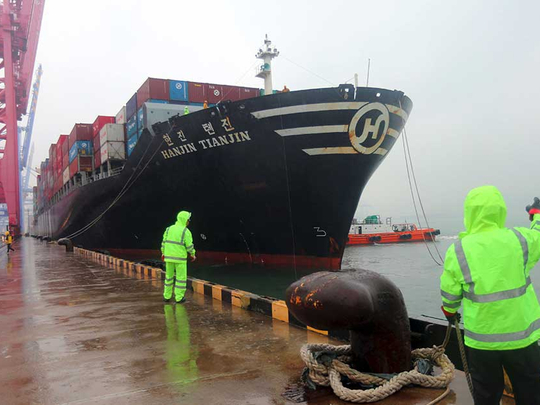
SEOUL: South Korea giant Hanjin Shipping said on Friday about a third of its cargo fleet — some forty vessels — is marooned at sea or has been seized at ports, as the industry staggers after its biggest ever bankruptcy filing.
On Wednesday, Hanjin Shipping, South Korea’s largest and the world’s seventh-largest shipping company, filed for court protection after its creditors, led by the state-run Korea Development Bank (KDB), rejected its self-rescue scheme.
The company is foundering under a debt estimated at some six trillion won ($5.37 billion), posting a net loss of more than 473 billion won in the first half of this year after racking up total net losses of about 1.2 trillion won over the past three years.
The crisis has badly hit the oversupplied international shipping industry, suffering from its worst downturn in six decades, and sent ripples as far as the US economy, with retailers fearing it may damage Christmas trade.
“Forty-five of our 144 vessels are unable to operate in the normal fashion in some 10 countries,” a Hanjin spokesman told AFP.
“Some of them are being impounded, others being barred from docking or discharging,” he said.
Since last month, Hanjin’s vessels, sailors and cargo have been stuck in a maritime limbo as ports, wary they will not be paid for their services, refuse to let them dock, as well as refusing to handle or free cargo already landed.
Also effected are ships not owned by Hanjin but contracted by it or belonging to its alliance members, along with cargo and containers on board those vessels.
US retailers, bracing for fallout from Hanjin’s woes as they stock up for the crucial Christmas holiday sales season, have asked Washington to step in to help resolve a growing crisis, the Wall Street Journal reported Thursday.
Ten Hanjin vessels were either seized or denied access at Chinese terminals in Shanghai and Tianjin over the past 48 hours, according to local media reports, with another vessel seized in Singapore earlier the week.
An estimated 540,000 containers are expected to face delivery delays, according to the reports.
Hanjin officially entered court receivership Friday, the Seoul Central District Court announced.
The court will decide whether to keep Hanjin afloat under a recovery programme including debt rescheduling or to declare it bankrupt.
Hanjin Shipping’s assets will in the meantime remain frozen, and the court-appointed new management is required to come up with a new rehabilitation plan by November 25.
South Korean financial authorities reportedly are considering letting South Korea’s No. 2 Hyundai Merchant Marine Co. take over Hanjin’s good assets, such as its global marketing networks and personnel as well as its own 59 ships.
Financial Supervisory Commission Yim Jong-yong on Friday met with KDB and Hyundai Merchant Marine officials and asked Hyundai to help ease cargo disruptions, Yonhap news agency said.
Accordingly, Hyundai plans to deploy a total of 13 vessels to the US and Europe, Yonhap added.
Hanjin faces a cash shortage of about one trillion won ($900 million) needed to roll over debts. But major creditors including the state-run Korea Development Bank decided Tuesday not to offer more help.
They said the firm failed to present a viable plan to turn around its business, which has been in the red every year since 2011 amid slowing demand in China and rising charter fees to shipowners.
Seoul, as part of a state-led drive to restructure ailing industries, has pressed Hanjin and Hyundai Merchant Marine to revamp their business and persuade creditors to extend loan terms.
Hyundai Merchant Marine avoided bankruptcy after reaching an agreement with creditors on a debt restructuring plan in May. But Hanjin failed to convince creditors.












